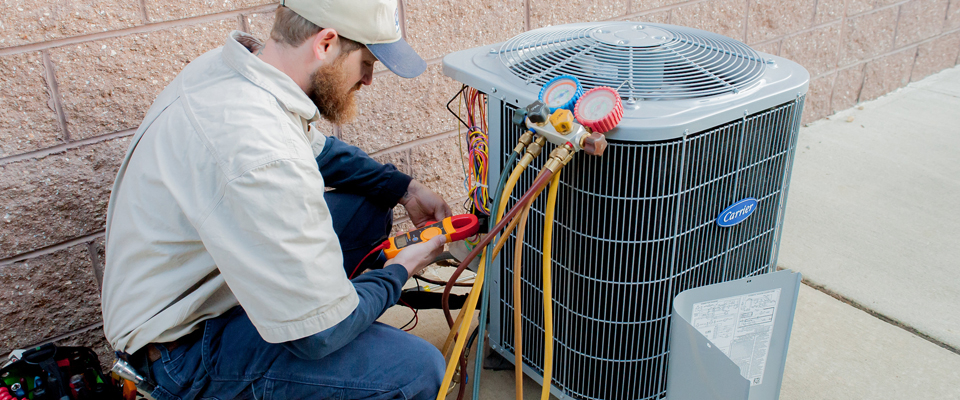Professional Maintenance Services by DMAKS HVAC For Your Needs.
Professional Maintenance Services by DMAKS HVAC For Your Needs.
Blog Article
Energy-Efficient Cooling And Heating Solutions to Minimize Energy Costs
As energy prices continue to climb, the significance of energy-efficient HVAC systems comes to be increasingly noticeable. These systems not only assure considerable financial savings on utility costs but additionally contribute to a much more sustainable future by lessening energy usage.
Advantages of Energy-Efficient A/c Equipments
Energy-efficient a/c systems offer many advantages that prolong past mere expense financial savings. One significant benefit is the lowered environmental effect. By eating less power, these systems contribute to lower greenhouse gas discharges, aiding to combat climate adjustment and advertise sustainability. This aligns with boosting social needs for environmentally friendly techniques in household and commercial setups.
Additionally, energy-efficient a/c systems often provide improved convenience levels. A lot of these systems feature innovative technology that enables for far better temperature level control and boosted air top quality (DMAKS HVAC). This brings about a healthier indoor setting, which is specifically vital for people with allergic reactions or respiratory issues
In addition, purchasing energy-efficient heating and cooling systems can enhance building worth. As even more consumers prioritize power effectiveness, homes and buildings outfitted with these systems might attract greater quotes in the property market.
Kinds Of Energy-Efficient Heating And Cooling Options
Just how can property owners and companies pick the most ideal energy-efficient heating and cooling options for their requirements? The market supplies a selection of energy-efficient heating and cooling systems, each designed to enhance convenience while reducing power intake.
One choice is the variable refrigerant circulation (VRF) system, which efficiently controls the temperature in multiple zones within a building. This system adjusts its cooling agent circulation to match the desired temperature level, resulting in significant energy cost savings.
Another popular choice is geothermal heatpump, which utilize the planet's steady temperature level to heat and cool spaces. By transferring warm to and from the ground, these systems demonstrate outstanding effectiveness, especially in modest environments.
In addition, ductless mini-split systems give an energy-efficient option for homes doing not have ductwork. These systems permit zone-specific heating and air conditioning, reducing power waste in empty areas.
Lastly, high-efficiency furnaces and air conditioning unit, with advanced SEER and AFUE ratings, supply reputable environment control while eating much less energy than standard models. By examining these alternatives, home owners and organizations can select a HVAC system tailored to their specific needs and energy effectiveness goals.
Key Functions to Think About

Following, examine the kind of compressor used in the system. DMAKS HVAC. Variable-speed compressors can adjust their result to match the heating or cooling down need, resulting in improved convenience and power financial savings compared to single-speed designs. Additionally, try to find systems geared up with clever thermostats that offer programmable setups and remote access, permitting better control over power consumption
An additional crucial function is the system's air filtering capacity. High-efficiency filters can boost indoor air high quality and decrease energy usage by making certain the system runs successfully. Consider the type of cooling agent made use of; contemporary systems commonly utilize environmentally friendly refrigerants that have a reduced ecological effect.
Lastly, ensure that the system works with zoning modern technology, which enables personalized temperature control in different locations of your home, improving comfort while decreasing power usage.
Tips for Picking the Right System

Following, take into consideration energy efficiency rankings, specifically the Seasonal Power Effectiveness Ratio (SEER) for cooling down systems and the Yearly Fuel Utilization Performance (AFUE) for heater. Higher ratings show higher effectiveness, which check these guys out can lead to substantial financial savings on utility bills with time.
Furthermore, evaluate the sort of a/c system that finest matches your way of life and budget. Alternatives consist of central air conditioning, ductless mini-splits, and warmth pumps, each with its own set of benefits and disadvantages.
Do not ignore the importance of proper installation and sizing; an inaccurately sized system can result in inefficiencies and boosted wear. Lastly, seek advice from a professional cooling and heating specialist to obtain skilled recommendations customized to your home's unique demands. This thorough method will certainly guarantee that you pick an energy-efficient heating and cooling system that fulfills your needs and budget plan properly.
Maintenance for Ideal Effectiveness
Once the ideal HVAC system is in location, ongoing upkeep becomes key to guaranteeing optimal efficiency and durability. A well-maintained system operates better, resulting in reduced power intake and lowered utility bills. Routine inspections and tune-ups ought to be scheduled at the very least twice a year-- when prior to the cooling period and when prior to the heating period.

House owners must also be attentive about monitoring their cooling and heating system's performance. Unusual sounds, rising and fall temperature levels, or increased power costs can indicate my response underlying concerns that require prompt attention. By attending to these problems immediately, house owners can stop costly repairs and prolong the lifespan of their systems.
Buying a maintenance plan with a certified technician not only enhances efficiency yet likewise provides assurance, knowing that the system is running at its ideal. DMAKS HVAC. Normal upkeep is as a result necessary for maintaining power performance and decreasing overall operational costs
Conclusion
In final thought, energy-efficient heating and cooling systems provide a feasible service for decreasing utility costs while boosting convenience and air top quality. By including sophisticated modern technologies and choices such as geothermal heatpump and ductless mini-splits, residential property proprietors can attain considerable energy financial savings and add to ecological sustainability. Mindful factor to consider of system functions and recurring maintenance further guarantees optimal performance, making energy-efficient systems a sensible investment for both basics financial and eco-friendly advantages.
Report this page